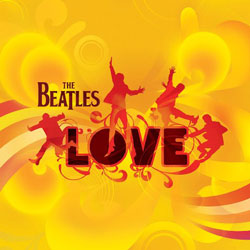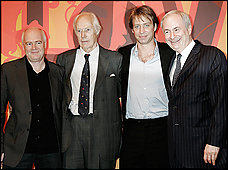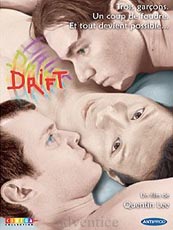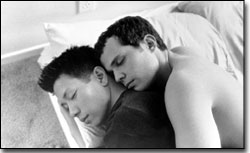I met up with Migs the Manila Gay Guy, Air in G, and other bloggers and non-bloggers last night. Migs asked me what I thought about the Inday Garutay and Aruba incident. It was my answer that inspired the title of this episode of The McVie Show, Season 5 and counting.
To be honest when I gave my answer last night, I was just blurting out things at the top of my head. But after mulling things over, I decided to write my thoughts down. Here they are.
* * * * *
For those who don’t about the Aruba incident, a quick recap: Inday G, an out-and-proud gay celebrity, attended an event in Aruba Bar in Metrowalk. He came in drag. Unfortunately the bar had a “no cross-dressing” policy. So even though he was already inside the bar, the staff went up to him and asked him to step out. Of course this angered Inday, but he was ejected from the bar nonetheless. So he sued the bar, and in subsequent interviews in the media he decried Aruba Bar’s discriminatory stance against gays. I think several gay organizations also spoke up in defense of Inday, and also lambasted the “no corss-dressing” policy of Aruba as “anti-gay” and “discriminatory.”
I think this was an incident that was badly mishandled by the Aruba Bar management. I’ve never been to the bar but I was told that there is a sign on their wall informing the public of their “no cross-dressing” policy. It should be displayed properly and clearly; otherwise, the customers aren’t to blame if they didn’t follow the policy. Plus, why did their doorman allow Inday to enter in the first place? The staff at the entrance should have enforced their rules. Clearly there was negligence on the part of the Bar to inform Inday of their policy as well as to enforce their policy at the entrance. If I were their manager I’d just allow this one incident to pass.
However, I think Inday’s reaction—calling this incident a case of “discrimination against gays”—is the equivalent of The Gay Who Cried Wolf. Aruba’s policy of “no cross-dressing” should not be seen as discriminatory against gays in general. (This attitude should still apply
even if we do find out that, indeed, the Aruba management came up with that policy specifically to prevent gay cross-dressers from entering their establishment.) I believe that policy discriminates against
cross-dressers, whether they be gay or straight. In other words, if Brad Pitt were to attempt to enter Aruba Bar wearing a skirt, he should not be allowed entrance either. This whole issue should be about a dress-code issue, not an anti-gay issue.
Insisting that the “no cross-dressing” policy is anti-gay presupposes that only gay people cross-dress. That is not true, especially in this day and age; I know of a straight male (a former officemate) who wears skirts to parties. Corollary to that, it also reinforces the notion among straight people (especially those with limited exposure to gay men) that all gay men cross-dress. Now, isn’t that reinforcing a
gay stereotype? Aren’t the efforts of all these pro-gay group aimed at eradicating stereotypes? Inday’s actions then are a step backward, not forward, towards eliminating gay stereotypes.
Besides, there is an obvious proof that Aruba Bar doesn’t discriminate against gays in general. I’m pretty sure that so many
pa-mhins and They-Who-Call-Themselves-Bi have gone in and out of Aruba Bar with impunity. In fact, I know of a top executive of a leading network who celebrated his birthday in Aruba Bar; aside from celebrities, many of his guests were out-and-proud gay folks—producers, designers, and even production assistants. Their obvious swishy demeanor and high-pitched vocal histrionics are dead giveaways: they are indubitably G-A-Y. But were they turned away at the entrance? Hell, no. That’s because
none of them were wearing a dress.
The problem arises when gay people try to appropriate certain behaviors, actions or attitudes, and insist that all these are “gay qualities”; ergo, to be against these behaviors, actions and attitudes is to be against gays. If there’s one thing that defines being a homosexual, it is
only this: given a choice, we will always prefer to have sex with people of the same gender. All the rest—the bitchy attitude, the lisps, the keen fashion sense, the near-universal love for Madonna and Barbra Streisand, the fascination for beauty contests—they are
not what define gay people. Because I know of several straight men who happen to like listening to Streisand; I am also a gay man who, for the life of me, does not have nor will ever have the Miss Universe “gene” in me. Does loving Streisand make a guy any less straight? Does ignorance of who the winner was in the 1967 Miss Universe pageant make me any less gay?
We’ve been fighting for years to break out of stereotypes. Please, Inday, don’t pigeonhole us. Besides, in the universe of all gay men only a small portion actually cross-dresses. Please, Inday, do not speak on behalf of the majority who are not fond of wearing taffeta. In the meantime, I
will defend your right to cross-dress, just as I will defend the right of Brad Pitt to wear a skirt—preferably very, very short and with no underwear underneath.
* * * * *
Going back to the dress-code issue, it is a fact that private establishments have the right to choose the kind of people they will allow to enter their premises. That means it is their right to discriminate, to be choosy. I see this as just a function of marketing and economics—if a bar wants to maintain a certain look or image, then they must have the right to impose limitations (age, dress-code, height, whatever).
So “no sando, slippers, and shorts” is as discriminatory as “no cross-dressing.” For me the bigger question is this: why do certain establishments insist on a dress code in the first place?
What’s more, if the public disagrees with such dress codes, then people can just boycott the establishment. If you’re a cross-dresser and you know you aren’t allowed into Aruba, they why insist on going in at all? Take yourself—and your money—somewhere else. Don’t insist on crashing into a party when you know you’re not even invited to it.
 Our company had a workshop in Tara Woods, Batangas. It’s a great venue for workshops, mini-conferences, or even day-away meetings and planning sessions. It’s a three-storey farmhouse that’s been converted to a bed-and-breakfast place. Just like in Sonya’s, one doesn’t need to bring towels and toiletries because they’re already provided. They don’t heavily advertise the place; they prefer to limit guests to those the owners personally know. Good thing our president is a good friend of the owners!
Our company had a workshop in Tara Woods, Batangas. It’s a great venue for workshops, mini-conferences, or even day-away meetings and planning sessions. It’s a three-storey farmhouse that’s been converted to a bed-and-breakfast place. Just like in Sonya’s, one doesn’t need to bring towels and toiletries because they’re already provided. They don’t heavily advertise the place; they prefer to limit guests to those the owners personally know. Good thing our president is a good friend of the owners!



















